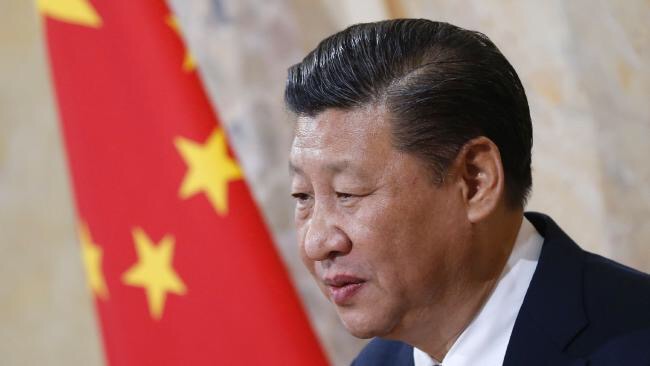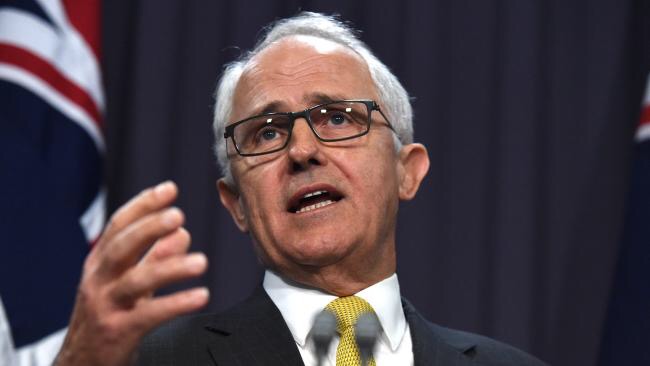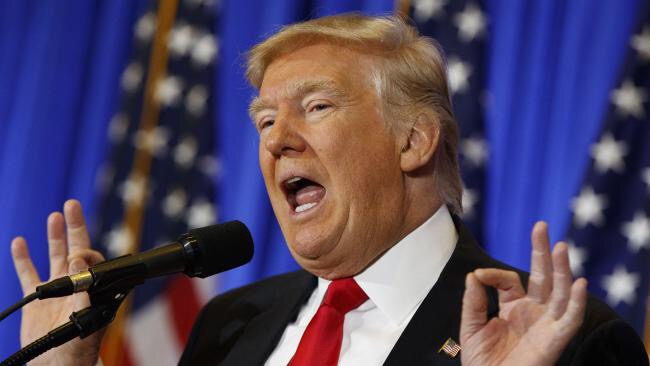China and US brawl, Australia under pressure to choose sides
EXPERTS have warned ongoing tensions between China and the United States could have disastrous consequences for Australia.
The two countries have been trading insults and threats ever since Donald Trump’s election win in November.
From trade to the South China Sea to the “One China” policy, nothing has been off-limits for discussion over the past two months.
This past week in particular has seen tensions soar, and they show no signs of slowing down.
The two countries have been trading insults and threats ever since Donald Trump’s election win in November.
From trade to the South China Sea to the “One China” policy, nothing has been off-limits for discussion over the past two months.
This past week in particular has seen tensions soar, and they show no signs of slowing down.
CHINA AND TRUMP LOCK HORNS AGAIN
In a recent interview with the Wall Street Journal, the President-elect sparked controversy after once again suggesting he was not committed to the “One China” policy.
In a recent interview with the Wall Street Journal, the President-elect sparked controversy after once again suggesting he was not committed to the “One China” policy.
Mr Trump said he would refuse to accept that Taiwan was not to be recognised diplomatically, until China — in his eyes — played fair on its trade and currency practices.
When asked on Friday if he supported the long-standing policy on Taiwan, he responded: “Everything is under negotiation, including One China.”
Beijing was quick to retaliate.
When asked on Friday if he supported the long-standing policy on Taiwan, he responded: “Everything is under negotiation, including One China.”
Beijing was quick to retaliate.
The morning after the interview was published, China foreign ministry spokesman Lu Kang issued a special statement on the ministry’s website reading: “There is but one China in the world, and Taiwan is an inalienable part of China.
“In order to avoid disruption to the sound and steady development of the China-US relations and bilateral cooperation in key areas, we urge relevant parties in the US to fully recognise the high sensitivity of the Taiwan question, approach Taiwan-related issues with prudence and honour the commitment made by all previous US administrations.”

The Chinese government issued a furious response over Donald Trump’s assertion the ‘One China’ policy is ‘under negotiation’.Source:AFP

The Chinese government issued a furious response over Donald Trump’s assertion the ‘One China’ policy is ‘under negotiation’.Source:AFP
China’s anxiety over the US has already been on the rise this past week, following provocative remarks from Rex Tillerson, Mr Trump’s nominee to be Secretary of State.
Mr Tillerson suggested the incoming administration would implement a stronger course of action with regards to the disputed South China Sea.
During his Senate confirmation hearing last Wednesday, the former ExxonMobil CEO compared China’s territorial claims in the region “to Russia’s taking of Crimea”.
He said the US would have to take big steps to prevent China from gaining access to the islands.
“We’re going to have to send China a clear signal that, first, the island-building stops,” Mr Tillerson said. “And second, your access to those islands also is not going to be allowed.”
His remarks add to growing evidence suggesting a Trump-led US government will take a stronger stance against China’s quest for power than previous administrations.
China’s state media predictably issued an aggressive response, with the state-run Global Times newspaper warning “the two sides had better prepare for a military clash” if the US carried out Mr Tillerson’s threat.
“Unless Washington plans to wage a large-scale war in the South China Sea, any other approaches to prevent Chinese access to the islands will be foolish,” the editorial said.
It asserted the US “has no absolute power to dominate the South China Sea”, saying his actions would be illegal.
If the dialogue between the two powers continues to descend, experts warn the outcome won’t be pretty.
COULD THE US CARRY OUT TILLERSON’S THREAT?
While there’s every chance the incoming Trump administration could wage war with China, the President-elect remains unpredictable.
Honorary Principal Fellow Dr Allan Patience from the University of Melbourne’s Asia Institute told news.com.au these hostile exchanges must not be taken lightly.
“Right now, the relationship between China and the United States is under strain quite considerably,” he said. “Nobody is clear on what Trump’s policy really is, he waivers constantly, but he does seem fairly aggressive.
“He keeps lashing out at China without really understanding the complexity of the issues.”
Mr Tillerson suggested the incoming administration would implement a stronger course of action with regards to the disputed South China Sea.
During his Senate confirmation hearing last Wednesday, the former ExxonMobil CEO compared China’s territorial claims in the region “to Russia’s taking of Crimea”.
He said the US would have to take big steps to prevent China from gaining access to the islands.
“We’re going to have to send China a clear signal that, first, the island-building stops,” Mr Tillerson said. “And second, your access to those islands also is not going to be allowed.”
His remarks add to growing evidence suggesting a Trump-led US government will take a stronger stance against China’s quest for power than previous administrations.
China’s state media predictably issued an aggressive response, with the state-run Global Times newspaper warning “the two sides had better prepare for a military clash” if the US carried out Mr Tillerson’s threat.
“Unless Washington plans to wage a large-scale war in the South China Sea, any other approaches to prevent Chinese access to the islands will be foolish,” the editorial said.
It asserted the US “has no absolute power to dominate the South China Sea”, saying his actions would be illegal.
If the dialogue between the two powers continues to descend, experts warn the outcome won’t be pretty.
COULD THE US CARRY OUT TILLERSON’S THREAT?
While there’s every chance the incoming Trump administration could wage war with China, the President-elect remains unpredictable.
Honorary Principal Fellow Dr Allan Patience from the University of Melbourne’s Asia Institute told news.com.au these hostile exchanges must not be taken lightly.
“Right now, the relationship between China and the United States is under strain quite considerably,” he said. “Nobody is clear on what Trump’s policy really is, he waivers constantly, but he does seem fairly aggressive.
“He keeps lashing out at China without really understanding the complexity of the issues.”

Secretary of State-designate Rex Tillerson has intensified tensions between China and the United States.Source:AP
While the Global Times claimed the US “has no absolute power to dominate the South China Sea” from a legal standpoint, Dr Patience says otherwise.
He said “international law would be on the side of the US”, pointing to a global tribunal in The Hague in July last year, which delivered a sweeping rebuke on China’s behaviour over the disputed region.
“My concern is whether (the Trump administration), in their most reckless minds, are questioning if we should provoke China now,” said Dr Patience.
“Because right now, in the event of a military conflict, America would win.
“It would be hellish, it would be appalling, but America would win, whereas a decade from now that may not be the case. This is my nightmare scenario.”
While China’s state media outlets are known for their deliberately-rousing editorials, Dr Patience says the west should not be taking them lightly.
“America needs to be taking these threats very seriously. This is not small talk. These are official organisations reflecting the President. We should really be hoping that intelligent diplomacy should step in.”
Such fears seem to be already resonating in Japan, which today announced it will provide an additional $AU1.4 billion in defence to Vietnam against China’s advances in the South China Sea, despite having no claims to the region.
Dr Patience acknowledged that President Xi Jinping is more “cautious” than his military, but warned there are “cowboys” in China’s defence force who are actively pushing for more action to be taken in the South China Sea.
Dr Allan Patience warns Donald Trump’s aggressive rhetoric on China is not to be taken lightly.Source:AP
But even despite the controversy over Mr Tillerson’s comments, Dr Patience says a war over the disputed islands are not the main threat. The future of Taiwan is.
“There is no other issue China would be more prepared to go to war on than Taiwan,” said Dr Patience. “It’s so entrenched in the Chinese mindset that Taiwan belongs to them.”
Last week, China and Taiwan engaged provocations after a Chinese fleet sailed north through Taiwan’s Air Defence Identification Zone (ADIZ).
According to the country’s state-run Central News Agency, Taiwan has deployed F-16 fighter jets, a surveillance aircraft and Navy frigates to “surveil and control” China’s ships in response.
Tensions between the two countries have been brewing since Mr Trump’s controversial phone call to Taiwanese president Tsai Ing-wen in December, which is understood to have broken with almost 40 years of foreign relations.
WHAT DOES THIS MEAN FOR AUSTRALIA?
The tense exchange has put allies of the US — including Australia — under pressure to clarify their position on Taiwan.
China and the US are Australia’s largest and third-largest trading partners respectively, and the guiding principal of our foreign policy has long been that we shouldn’t choose one or the other.
“Australia remains committed to the One China policy while also maintaining unofficial contacts with Taiwan promoting economic, trade and cultural interests,” Foreign Minister Affairs Julie Bishop told the Australian Financial Review yesterday.
“The Australian government will seek to work constructively with the Trump administration after the inauguration on 20 January, and this will include our perspectives on East Asian challenges and opportunities.”
But Dr Patience warns we will ultimately have to pick a side at the way things are going, suggesting the powers’ exchanged threats could have “hideous consequences for Australia”.
“We have three choices,” he said. “We could veer right, support Trump, and choose to involve ourselves in any military campaign the US launches on China. This would be disastrous — all of our access to China’s economy would be wiped out.
“The second option is we turn left and say we’ll support China.
“The third option is we go straight ahead and remain utterly neutral, hoping we can keep them both.”
“There is no other issue China would be more prepared to go to war on than Taiwan,” said Dr Patience. “It’s so entrenched in the Chinese mindset that Taiwan belongs to them.”
Last week, China and Taiwan engaged provocations after a Chinese fleet sailed north through Taiwan’s Air Defence Identification Zone (ADIZ).
According to the country’s state-run Central News Agency, Taiwan has deployed F-16 fighter jets, a surveillance aircraft and Navy frigates to “surveil and control” China’s ships in response.
Tensions between the two countries have been brewing since Mr Trump’s controversial phone call to Taiwanese president Tsai Ing-wen in December, which is understood to have broken with almost 40 years of foreign relations.
WHAT DOES THIS MEAN FOR AUSTRALIA?
The tense exchange has put allies of the US — including Australia — under pressure to clarify their position on Taiwan.
China and the US are Australia’s largest and third-largest trading partners respectively, and the guiding principal of our foreign policy has long been that we shouldn’t choose one or the other.
“Australia remains committed to the One China policy while also maintaining unofficial contacts with Taiwan promoting economic, trade and cultural interests,” Foreign Minister Affairs Julie Bishop told the Australian Financial Review yesterday.
“The Australian government will seek to work constructively with the Trump administration after the inauguration on 20 January, and this will include our perspectives on East Asian challenges and opportunities.”
But Dr Patience warns we will ultimately have to pick a side at the way things are going, suggesting the powers’ exchanged threats could have “hideous consequences for Australia”.
“We have three choices,” he said. “We could veer right, support Trump, and choose to involve ourselves in any military campaign the US launches on China. This would be disastrous — all of our access to China’s economy would be wiped out.
“The second option is we turn left and say we’ll support China.
“The third option is we go straight ahead and remain utterly neutral, hoping we can keep them both.”

Dr Patience has called on the Australian government to seriously consider our response to our key trading partners’ rising tensions.Source:AAP
While the third option is obviously the ideal option, Dr Patience says this is not sustainable.
“We haven’t put ourselves in a position where we can be entirely neutral — it’s an interesting broker because of our slavish commitment to the US alliance,” he said.
He stressed his belief that the Australian government needs to step back and re-think the country’s military commitments.
“Now, more than ever, we have to really think about whether this is in our national interest, to be this thoroughly obedient ally of the US. We’ve been to every bloody war the US has had since World War II — it’s not sustainable. We need to seriously consider our defence budget, and the idea that we can be friends with America without being war allies.”
Of the Australian government — namely Prime Minister Malcolm Turnbull, Ms Bishop and Defence Minister Marise Payne — he said: “I think they’re scared, I think they’re incompetent, and I think they’re unintelligent. Years ago, in the ‘60s, Donald Horne wrote The Lucky Country. In the last chapter he said Australia is a lucky country run mainly by second-rate people who share its luck.
“That’s no longer true. Australia is a lucky country run by third-rate people.”
Mr Trump will be officially inaugurated into the White House this coming Friday.
“We haven’t put ourselves in a position where we can be entirely neutral — it’s an interesting broker because of our slavish commitment to the US alliance,” he said.
He stressed his belief that the Australian government needs to step back and re-think the country’s military commitments.
“Now, more than ever, we have to really think about whether this is in our national interest, to be this thoroughly obedient ally of the US. We’ve been to every bloody war the US has had since World War II — it’s not sustainable. We need to seriously consider our defence budget, and the idea that we can be friends with America without being war allies.”
Of the Australian government — namely Prime Minister Malcolm Turnbull, Ms Bishop and Defence Minister Marise Payne — he said: “I think they’re scared, I think they’re incompetent, and I think they’re unintelligent. Years ago, in the ‘60s, Donald Horne wrote The Lucky Country. In the last chapter he said Australia is a lucky country run mainly by second-rate people who share its luck.
“That’s no longer true. Australia is a lucky country run by third-rate people.”
Mr Trump will be officially inaugurated into the White House this coming Friday.

No comments:
Post a Comment
Comments always welcome!